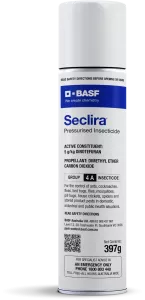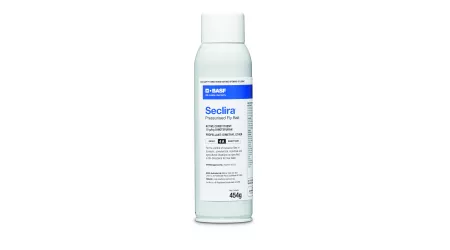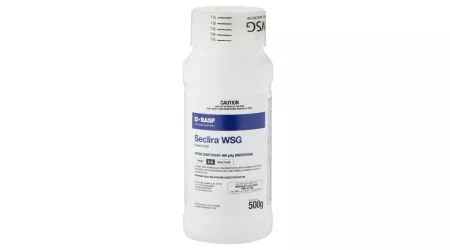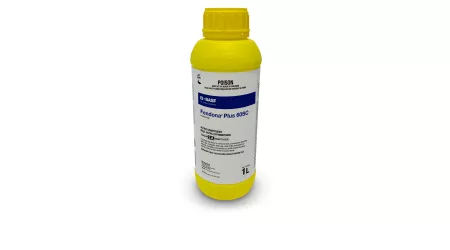Key benefits
- Unique acting solution
- Superior knockdown effect
- Transfer technology for unmatched performance
How it works
Seclira® Pressurised Insecticide provides a unique mode of action – third generation neonicotinoid. This affects the nicotinic acetylcholine binding in a mode that differs from other neonicotinoids, and is found highly active where imidacloprid resistance has developed.
Seclira Pressurised Insecticide is effective through both contact and ingestion.
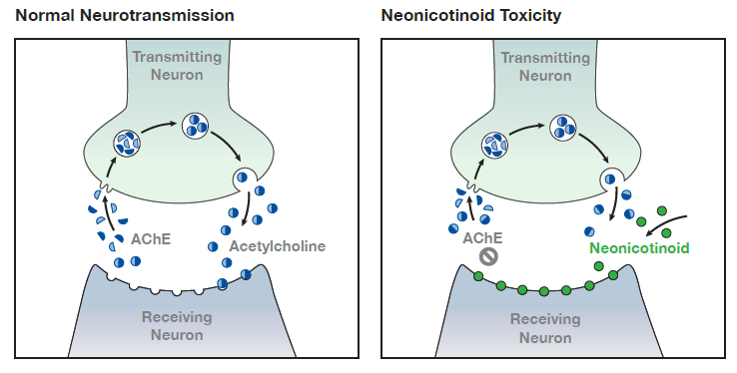
Left: In normal neurotransmission, an the AChE enzyme, (acetylcholinesterase) creates a reaction which breakdown acetylcholine (ACh) and revents overstimulation and blockage of receptors.
Right: When Dinotefuran is introduced, the ACh receptors are blocked. This leads to overstimulation and the quick and fatal disruption of the nervous system.
Questions and Answers from the Field
-
Can I spray Seclira Pressurised Insecticide on my bed?
Seclira Pressurised Insecticide can be sprayed both indoors and outdoors to control various pests such as ants, cockroaches, spiders, bed bugs and flies. Seclira is a highly effective spray insecticide that can be sprayed to control bed bug activity as a spot treatment or as a surface treatment in and behind bed heads and bed frames and bedside tables. No application of Seclira should be applied to the mattress or bedding materials.
-
Can I use insecticide in my house?
Seclira Pressurised Insecticide can be used in your house – as its approved for both indoor and outdoor use to control a number of pests. Seclira Pressurised Insecticide provides a unique mode of action that offers a superior knockdown effect when dealing with a range of household pests.
-
Does insecticide kill all mosquitoes?
Seclira Pressurised Insecticide can kill all mosquitos. With its superior knockdown effect and unmatched performance, Seclira Pressurised Insecticide is a highly effective for killing mosquitos.
-
How do I get rid of pill bugs?
To get rid of pill bugs, use Seclira Pressurised Insecticide. Seclira offers fast acting, precise and undetectable insect control of pill bugs and a range of other indoor and outdoor pests.
-
How do you control storage product pests?
To control storage pests, use Seclira Pressurised Insecticide. Seclira is a fast-acting insecticide that is highly effective at controlling storage pests and offers long lasting residual control for up to three months.
-
How does Seclira work?
Seclira Pressurised Insecticide works through contact or ingestion to effectively kill a number of pests, such as ants, cockroaches, mosquitos, pill bugs, flies, spiders and other pests. Seclira can be sprayed into cracks and crevices and is fast acting plus it has a Genuine Transfer Effect – which is useful for controlling social insects.
-
How fast does insecticide kill cockroaches?
Seclira Pressurised Insecticide is a fast-acting product that kills cockroaches in short time frame. Seclira is a fast-acting, non-repellent, ready-to-use insecticide that controls a broad range of pests including cockroaches.
-
How long do insecticides last on surfaces?
Seclira Pressurised Insecticide lasts on surfaces for up to three months – offering long lasting residual control of a number of insects. Seclira is a groundbreaking insecticide that is fast acting and highly effective at killing insects both indoors and outdoors.
-
What can I spray to kill spiders?
Seclira Pressurised Insecticide can be sprayed to kill spiders. Seclira Pressurised Insecticide is a highly effective spray insecticide that can be used to kill spiders and a number of other problem insects both indoors and outdoors.
-
What insecticide do pest professionals use?
Pest professionals use Seclira Pressurised Insecticide – which offers ground-breaking control of a number of insects. Seclira Pressurised Insecticide is a fast-acting, non-repellent, ready-to-use product which controls a broad range of pests including ants, and cockroaches. Find your pest professional here.
Pests Controlled
-
Commercial buildings / areas
Stored product pests -
Domestic buildings / dwellings
AntsBed bugsCockroachesFliesHouse cricketsMosquitoesPillbugsSpiders

